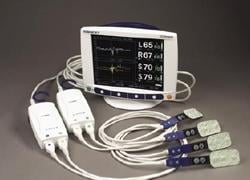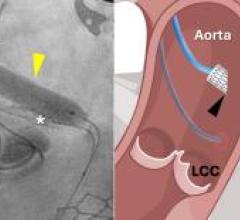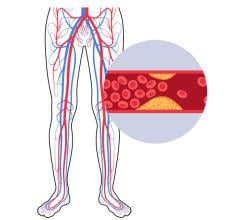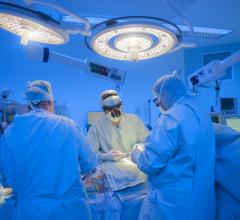
February 14, 2011 – Cardiac surgeons now have a simple, noninvasive way to assess patients at risk for poor outcomes prior to surgery with the Invos Cerebral/Somatic Oximeter, from Covidien.
New evidence, published in Anesthesiology, showed that cerebral regional oxygen saturation (rSO2) values, which reflect brain oxygenation, measured prior to cardiac surgery, were independent predictors of 30-day and one-year morbidity and mortality. This is the first adult study to link decreased preoperative cerebral rSO2 with postoperative morbidity and mortality.
“Our finding suggests that low, presurgical cerebral rSO2 might serve as a refined physiological marker for preoperative risk stratification in cardiac patients,” said lead investigator Matthias Heringlake, M.D., Universitaet zu Luebeck, Germany. “This enhanced assessment may also enable physicians to proactively consider adding or tailoring care therapies per patient.”
The study assessed cerebral rSO2 readings from the Invos system in 1,178 adult patients about to undergo on-pump cardiac surgery. The analysis showed that baseline cerebral rSO2 values less than or equal to 50 percent were independent predictors of 30-day and one-year morbidity and mortality.
It also showed a statistically significant correlation between cerebral rSO2 values and traditional measures of cardiopulmonary function, such as left ventricular ejection fraction, pro-B natriuretic peptide and kidney filtration rate, among others.
“Consistent with these new findings, earlier studies showed that rSO2 not only reflects cerebral oxygenation, but also a patient’s overall cardiopulmonary function and systemic oxygen needs,” said John M. Murkin, M.D., FRCPC, of the Schulich School of Medicine at the University of Western Ontario, whose earlier trial showed a connection between adequate rSO2 and improved patient outcomes. “If non-cardiac researchers confirm similar benefits of cerebral rSO2 monitoring, then it could be employed as a simple, sensitive and noninvasive way to enhance the preoperative risk assessment of noncardiac patients as well.”
Other recent research found that cerebral rSO2 monitoring provides a first alert to changes in oxygenation that could potentially lead to an adverse patient outcome. Cerebral oximetry data were registered from January 2008 through December 2009 in the Society of Thoracic Surgeons (STS) Adult Cardiac Surgery Database. Initial findings were released in July 2010 and showed that in nearly one in four (23 percent) cardiac surgery procedures (n=36,548) “cerebral oximetry provided the first indication of a technical problem or physiologic change that could potentially lead to an adverse patient outcome.”
“Oxygen deficiencies that lead to neurological injury or other complications often have no initial outward signs,” said Scott Kelley, M.D., vice president, medical affairs, respiratory and monitoring solutions, Covidien. “They can brew silently and go undetected until damage has already been done. Use of preoperative rSO2 could augment anesthesiologists’ already robust practices for vigilance and patient safety.”
For more information: www.covidien.com


 January 15, 2026
January 15, 2026 









